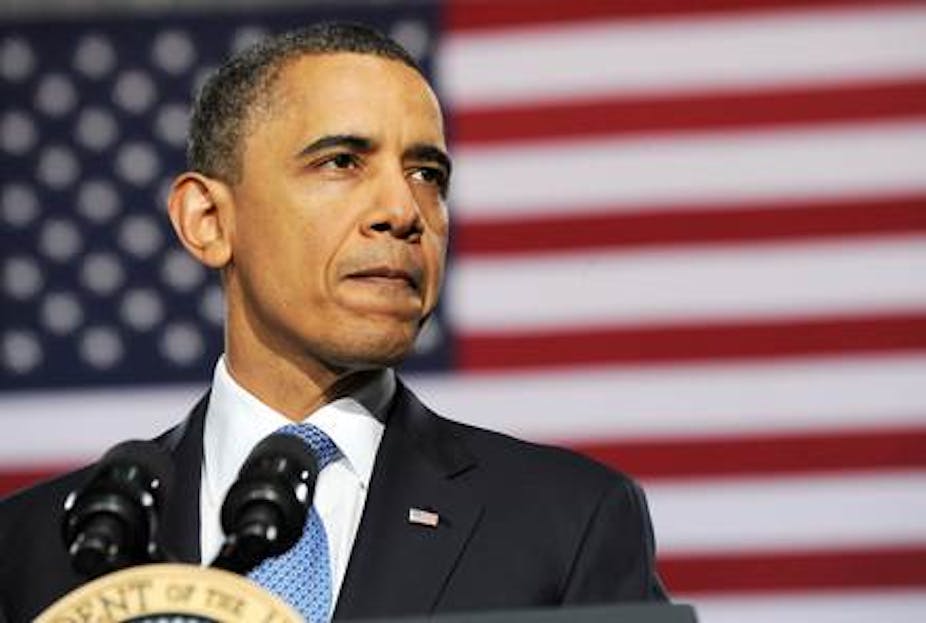Was it a surprise that President Obama’s launch for the 2012 election was so low key? That he tweeted his intention to raise US$1billion? That he posted what the New York Times called an “understated” internet video?
In 2008, just under 53 per cent of the American voting public, joined by much of the rest of the world, roared their approval for the cosmopolitan antidote to George W. Bush. Academics, not merely their students, put the iconic blue and red “HOPE” posters of Obama on their office walls.
Few had done this for Bill Clinton and Jimmy Carter. One would have to go back to JFK in 1960 to find an analogue for the enthusiasm of 2008. “Yes we can!” “Change is coming.” Why then was the relaunch and the selling of the ensuing “Obama revolution” so muted?
The launch was low-key for some fairly obvious reasons and for reasons that have been missed or elided. The obvious reasons first.
Obama has not transformed the American presidency into an unstoppable tool of political, social, and economic transformation. His domestic agenda hinged on two things: “Obamacare” and jobs.
The price he paid for passage of his healthcare reforms was a highly circumscribed piece of legislation that disappointed his base but was sufficiently ambitious to invite inevitable legal challenge. Its fate, like that of all congressional legislation, will ultimately fall into the hands of the Supreme Court.
These nine unelected judges (two of them appointed by Obama himself) will soon get to rule on whether the federal government can compel Americans to take out private health insurance.
In terms of jobs, Obama’s record is defendable. No president since FDR in 1936 has won re-election with unemployment higher at the end of his term than at the beginning. Obama will run hard on the link between his enormous economic stimulus and the recent fall in the number of Americans out of work (from 10.1 percent in October 2009 to 8.8 last month).
The economic train wreck he inherited over two years ago may not be back on track but at least the track, he can plausibly claim, is being re-laid. Still, in toto, his domestic agenda can hardly be described as “the change we have been waiting for”, which is why it will be the background hum rather than the battle-cry of his second term campaign.
The less obvious reasons for the mildness of his relaunch are fundamentally strategic. In 2008 he was able to capitalise on and articulate the righteous anger of a people fed up with the “Toxic Texan”
Promising at every turn to be the “un-Bush” candidate cost Obama very few votes. The economic recession was never going to favour the incumbent party. Obama’s colour (literally and metaphorically) and rhetoric (some of the most remarkable we have heard in recent years) further cemented the difference between the old order and the purported new.
The boldness of that campaign fitted the mood of American society very well. This time round, Obama is running not against the Bush record but on his own. Where once he could condemn now he must defend.
Another reason for his comparative muteness is tied to the first. Obama is arguably a much better electoral campaigner than he is a chief executive. His outsmarting of Hillary Clinton in the Democratic primaries was a master class in political strategy that he has yet to recreate from the Oval Office.
This time, he faces no internal challenger (or is at least very unlikely to). Crucially, the external Republican candidate is yet to emerge. It could be one of several people. When that man or woman (though it seems to me impossible to comprehend how Sarah Palin could secure the GOP nomination let alone the presidency itself) is nominated, his or her appeal will depend on recurrent and vocal denunciations of the “socialization” and “Europeanization” of America.
Obama is coolness personified. He will ride this rhetorical storm out. He has set the tone of that counter-campaign in the manner of its launch.
Obama’s quietude is, finally, a reflection of an uncomfortable (for his base) but predictable political reality. He occupies the same domestic and geostrategic space as his maligned predecessor.
Obama has not been the anti-Bush president of his supporters’ fantasies. He has expanded the spirit of Bush’s bold education agenda – No Child Left Behind – into the arena of public health – Obamacare. He has kept Guantanamo Bay open. He has asserted that “evil exists in the world”. He has retitled the war on terror but continues to fight it.
He has made war on a Muslim state – with a smaller multilateral coalition in Libya than did Bush in Iraq. Four years ago he loudly offered “change”. This time he is quietly defending a continuity with his predecessor that we can believe in.
Setting oneself up as a more competent version of George W. Bush is hardly a reason for shame but, Obama has concluded, it is better tweeted than roared.

